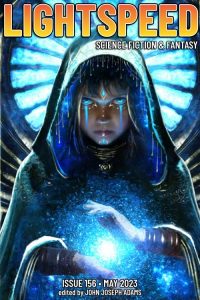Karen Burnham Reviews Short Fiction: Clarkesworld, Asimov’s, and The Future Fire
 Clarkesworld 6/22
Clarkesworld 6/22
Asimov’s 5-6/22
The Future Fire 4/22
There is so much meaty content in the June Clarkesworld that it’s hard to know where to start. Good thing then, that the opening story rolls up its sleeves and gets right to it. “Company Town” by Aimee Ogden features Cass, working for and living in an Amazon-style constant-surveillance dystopia. While Cass is part of a group trying to evade the monitors and organize a work stoppage, her partner Maya gets pulled through a portal into fantasy-world quests. Years may pass in the other world while Cass waits to find out if Maya will return in hours, days, or ever. Eventually the company gets wind of the workers’ plans, and in the subtext beneath the climax is an interesting reclaiming of the mantle of heroism from the epic fantasy milieu back into something more terrestrial. “We Built This City” by Marie Vibbert is also a worker’s story. On Venus maintenance of the exterior is critical to keeping a floating city, administered by Mexico, aloft. Julia Lopez is one of a crew of eight performing this necessary work, and she loves it despite her mother’s disapproval. When the city cuts the maintenance staff from eight down to four, Julia, despite being kept on, decides to make a stand. But how to do that, how to take control of the narrative when the administration holds all the cards? As with Ogden’s story, labor organizing is no simple matter. Then “The Odyssey Problem” by Chris Willrich dives deep into questions of ethics. I can’t help but summarize the opening of the story the way it coalesced in my mind: what if the child at the center of Le Guin’s “The Ones Who Walk Away from Omelas” was rescued by the crew of the USS Enterprise? What if Omelas’s society collapsed into violence as a result? Then what if the Trek crew ran into a being of higher intelligence, how would it judge their actions? And then a higher intelligence still? The story is told from the child’s point of view as different ethical systems clash dramatically. I don’t think I fully agree with what I take to be Willrich’s ultimate point here (although that would require a whole separate essay/column to work through), but the story is thought provoking.
On a more intimate scale, Anna Martino brings us “Manjar dos Deuses”. The central SFnal idea is that time travel of a sort can be linked to peoples’ memories, and those memories can be recovered from tissue or hair samples. Daniel is a master chef who delves into the memories folks provide and recreates the meals that mean the most to them. He flung himself into this career in response to a childhood of want and hunger where dry white toast might be dinner. Now his mother, caustic and uncaring, is in hospice and his sister is asking him to try to reach her through food. His investigations help the siblings understand their mother better, but truly reaching her is a much steeper climb.
The May/June Asimov’s is evenly split between seven novelettes and seven short stories. There’s a lot here to enjoy. In Kristine Kathryn Rusch’s novelette “Rocket Girls”, she reclaims the “build a rocketship in your backyard” trope from the pulps and Boy’s Own kind of adventures. Inspired by lurid pulp magazine cover art, a team of trust fund girls build their own rocket ship and fly it while wearing thigh high boots and cutaway teddies. How much is the narrator, a team member relating this oral history to an interviewer in a sharp voice loaded with attitude, just messing with us? I don’t know, but the whole thing was really fun. “Destiny Delayed” by Oghenechovwe Donald Ekpeki imagines Chinedu going to work for a bank that extracts people’s destinies to use as collateral for loans. He convinces Mr. Mukoro to mortgage his daughter’s destiny to fund his research, but despite his success, Mukoro is never allowed to fully repay the loan and reclaim her lost destiny. But his inventions might also give him a path towards reclamation and revenge. “The Abacus and the Infinite Vessel” by Vikram Ramakrishnan is a great immigrant story. Kutti, a successful professor, reflects on how she first arrived on Mars with her Amma – but without her father who died suddenly even as his Martian university appointment was pending. Not having a job lined up, she and her Amma struggle to make enough to avoid deportation, but eventually they are able to find an ingenious way to succeed and prosper.
There are a couple of stories that are somewhat heavy handed but sincere. “Coyoteland” by Evan Marcroft imagines trying to cross the Southwest of what had been the United States but is now a series of microstates with ever-shifting borders. Jacinta agrees to smuggle Vee through the shifting territories, using every trick she knows. Every border crossing is violent, and even buying citizenship or visas doesn’t work because the boundaries and alliances change too quickly. Through it all Vee is encouraging Jacinta to have a less cynical view of the world – especially challenging when they’re caught in a “borderstorm” where even the AI drones aren’t sure where the borders are or with whom they’re supposed to be allied. It’s a quite pointed look at one possible end state of the continuing fractures in the US polity. “30” by Rich Larson features a gentleman who keeps seeing ghost splinters of himself, living the different lives he could have had. They all seem to be having a better time than he is. Trying to avoid any place his other selves might have wound up, he finds himself in an overpriced country & western bar. A conversation with his sister helps him view the situation more positively as his thirtieth birthday approaches. The big round ages do tend to induce self-reflection, don’t they?
Three stories here continue various series which fans old and new will likely enjoy. Sheila Finch has a new installment in her Lena and the Octopus series in “The Wine-Dark Deep”. Lena Ke’aloha is having trouble spreading the word about cephalopod communication when a Greek scion invites her to look at the markings he found in an underwater cave. It definitely means something to the octopodes she knows and hints at something beyond the day-to-day concerns of a scientist and her lab work. R. Garcia y Robertson’s novelette “Silverado” continues his Amanda James series with some complicated intrigue involving the town of Tombstone in 3V. He balances the “real world” and 3V plots nicely, although sometimes it was hard to tell what the stakes really were. And Robert Reed’s novelette “Necklace of Memory” is set in his Great Ship universe, delving deep into metaphysics as Ash interviews the Morrigan, who might be responsible for the extinction of an intelligent race. While Ash’s work spreads over millions of years, Reed doesn’t let the story drag.
The April issue of The Future Fire is themed TFF-Noir and highlights some very new authors. Four short stories and a novelette all share a Noir style, and the issue serves to tease a forthcoming Noir Fire anthology, edited by Valeria Vitale & Djibril al-Ayad. Starting with the novelette, “avenging the sorrow” by Lam Ning is chilling and complex. The narrator is an immigrant who works for a violent landlord. He tries to keep his head down, but can’t help rescuing a kitten–and might also need to help the landlord’s illegitimate and (disappointingly to his father) very kind son, Kiku. Kiku’s mother, once the landlord’s mistress, is a practitioner of a magic that the narrator also understands. But the narrator has his own problematic son, and these family dramas intersect over a deep well of magic. For a very new author (another publication appeared in The Future Fire last year), Ning is making an excellent showing.
Elsewhere in the issue, “A Prayer to St. Jude” by M. Bennardo centers on Madame Cassie. Her business is finding lost things, and despite her cheesy props there’s real magic behind it. But there’s a bald man who always seems to find her, and she moves to a new town every time he shows up. Bennardo builds up the story very neatly, moving from an almost silly premise into tangible horror. “The Fox and the Snake” by Timothy Yeo (another early career author doing good work) features a mischievous fox spirit, hired by his ex-girlfriend to pry apart her mother and the naga spirit feeding on her in the form of an adorable ten year old girl. That’s a complicated sentence and it is not a simple story, full of layers of tricks and betrayals. I appreciated having the fox be the narrator–always the trickster but not always keeping track of the tricks of others.
Recommended Stories
“avenging the sorrow”, Lam Ning (Future Fire 4/22)
“Company Town”, Aimee Ogden (Clarkesworld 6/22)
“The Abacus and the Infinite Vessel”, Vikram Ramakrishnan (Asimov’s 5-6/22)
“The Odyssey Problem”, Chris Willrich (Clarkesworld 6/22)
This review and more like it in the August 2022 issue of Locus.
 While you are here, please take a moment to support Locus with a one-time or recurring donation. We rely on reader donations to keep the magazine and site going, and would like to keep the site paywall free, but WE NEED YOUR FINANCIAL SUPPORT to continue quality coverage of the science fiction and fantasy field.
While you are here, please take a moment to support Locus with a one-time or recurring donation. We rely on reader donations to keep the magazine and site going, and would like to keep the site paywall free, but WE NEED YOUR FINANCIAL SUPPORT to continue quality coverage of the science fiction and fantasy field.
©Locus Magazine. Copyrighted material may not be republished without permission of LSFF.








